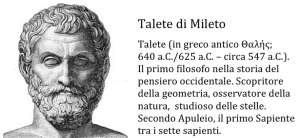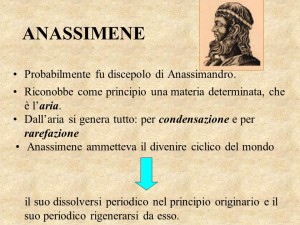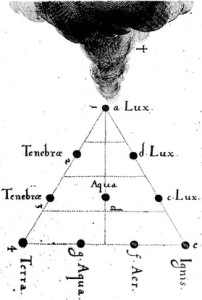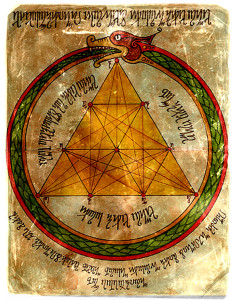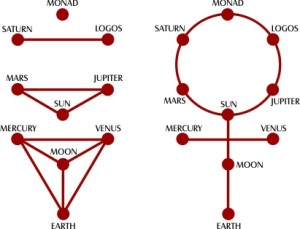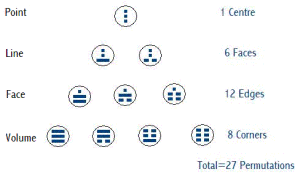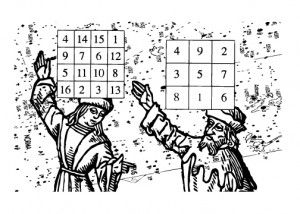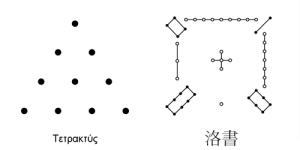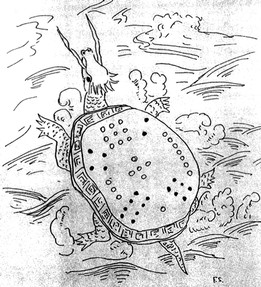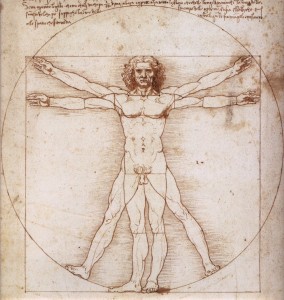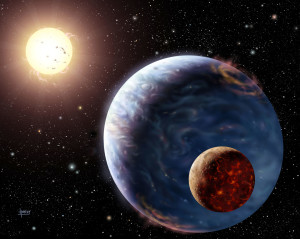Philosophy and Feng Shui: a comparison between the oriental foundations of Feng Shui and the first Greek philosophical schools in order to highlight the effectiveness of the Feng Shui method and its applications.
It is always difficult to say if someone had copied another author’s work in ancient times, while in the era of globalization the copy-paste philosophy is the common denominator of a society without many ideas.
In an article published in the Proceedings of a conference I had proposed a parallelism between Jewish Kabbalah and Chinese Numerology, based on the Magic Square of order 4, where important analogies between the two systems left open the question about whether in that remote age those so distant cultures could have communicated or could have come to common conclusions, which is highly probable, given that the structure of the Universe is always the same under any sky.
Also the oriental philosophical principles of Taoism which in turn supports the basic concepts of Feng Shui as we know it, could be put in parallel with Western thought, in particular with the first Greek philosophical schools.
The amazing aspect is that while at the dawn of Greek thought (600-500. BC) schools with substantially different principles and presuppositions were formed, Taoism is based on philosophical presuppositions that appear to be the harmonious synthesis of what in the Western thought was seemingly conflicting, with the important exception of Eraclitus, whose philosophy is supported by the principle of the substantial coincidence of the opposites and the global harmony of the Whole, with an amazing likeness with the concepts expressed in the Tao tradition. (Monica Cavallé – La sabiduria recobrada / The Regained Wisdom : Filosofia Como Terapia / Philosophy as Therapy – Grupo Anaya Comercial).
The first of the Greek philosophers is unanimously recognized to be Thales. He bases his doctrine on the principle (arké) of water.
The water we are talking about here is not physical, but it is related to a metaphysical concept being very close to the semantic domain of the word ‘Shui’, which also means ‘water’ and is part of the binomial Feng-Shui, the science we deal with in our website.
The second philosopher in chronological order after Thales is Anaximander who is one of the precursors of the Big Bang theory: for him at the origin of Universe there is Fire and an explosion caused by the excess of vapours which generates the celestial bodies, the Earth and Water.
But the origin of the Universe finds its presupposition in an undifferentiated principle in eternal becoming, the “apeiron”, from which the multiplicity of life arises. The “arké” of Anaximander is very similar to the supreme Tao from which the myriad of things derives. The third philosopher is Anaximenes whose “arké” is Air, which the Tao calls Feng, the other element that forms the binomial Feng Shui. Not only that, but from the “arké” Air, Water, Earth and Stone are generated by subsequent condensation: We are very close to the Wu Xing of Taoism where five elements are as well generated by condensation: water, wood, fire, earth, metal (stone).
Finally we will mention Pythagoras, a leading figure for the history of thought, and in particular for one of its main “arké”: the “tetraktis”.
The succession of the first 10 numbers ordered in a hierarchical way in a triangle, is the main reference of innumerable western initiatory and theosophical schools:
also in the generation of the trigrams of Tao, however, the succession of the first ten numbers has the same meaning of the Pythagorean “Tetraktis”, as with these first ten numbers show the first generation of energy differentiated in the space from the primeval Tao.
However, there are further analogies between West and East which are essentially associated to the representation of the cosmos and its evolution in numerological and geometric terms.
For example, it is natural to approach the “Tetraktis” by Lo Shu:
as we can see in the brilliant article by Roberto Milazzi of the IUAV University of Venice
Both structures conceal within them the decoding keys of the secrets of the cosmos and life, which is why, getting back to Feng Shui, we always refers to the word “harmonization”: by applying the laws which perfectly rule the macrocosm through seemingly simple mathematical and geometric schemes, it is possible to transfer them even to a small space like our home, with a good chance of obtaining some positive effects.
The opportunities of harmonizing our homes according to the so-called sacred geometry are almost endless but Feng Shui helps us to find a specific pattern which summarizes the ultimate reference structure, that is the cosmic one, in a precise but simple sequence based on the numbers from 1 to 9
Without forgetting that we, as human beings, are also made upon the foundation of similar patterns: the list of parallels and relationships between the cosmos and man could be interminable, from Taoist medicine to the Jewish cabala with its Macro and Microprosopos, until to Leonardo’s Vitruvian Man
So, when we work with Feng Shui in our homes, we doing nothing but trying to harmonize man and his environment – which are highly exposed to undesirable karmic effects – by following that model of perfection and beauty that is cosmos, seat of the Divine center, “the love that moves the sun and the other stars”, the motionless engine, as Aristotle defines it, which is beyond all spheres and stars.
